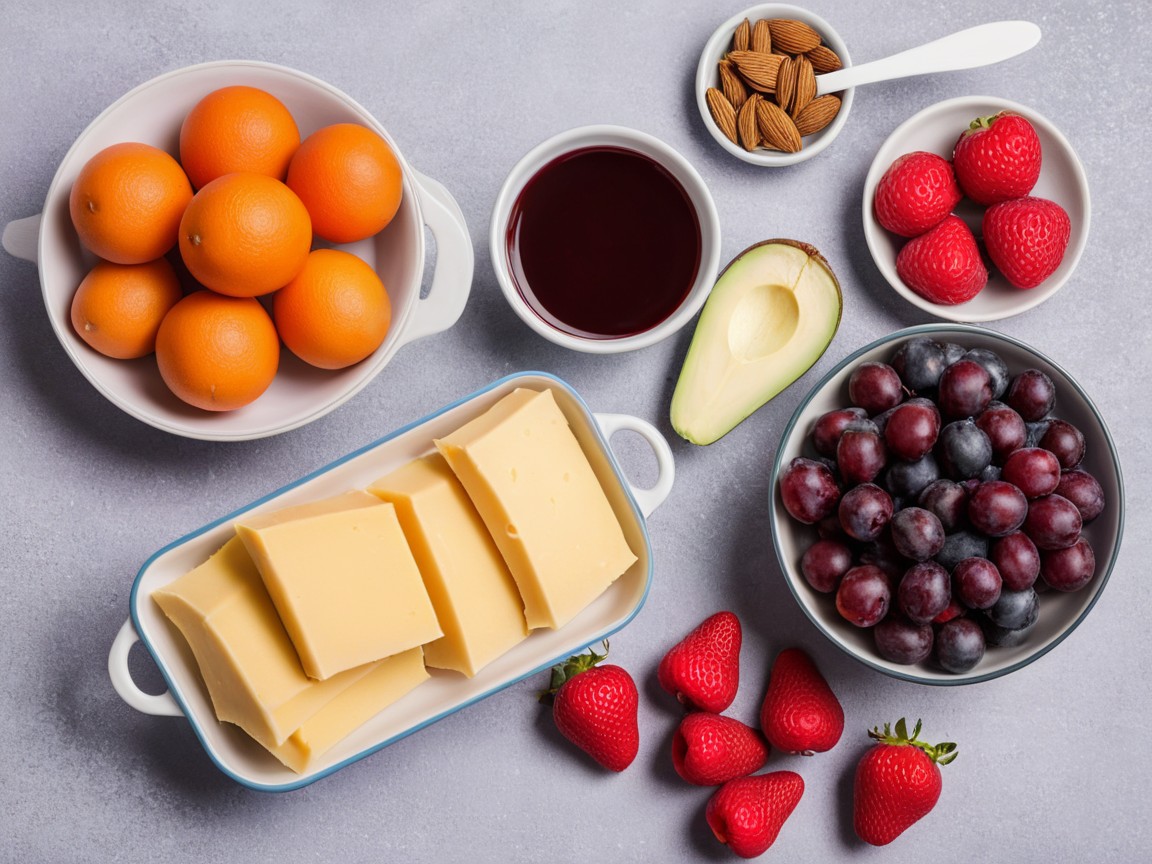Periods — the monthly guest that arrives uninvited and brings along a host of physical discomforts and emotional ups and downs. While we can’t make them disappear, we can make the experience more manageable.
The secret?
The right foods!
Yes, you heard that right—what you eat can significantly impact how you feel during your menstrual cycle.
In this blog, we’ll explore how foods to eat and avoid during your period can make a world of difference. From soothing cramps to boosting your mood, let’s dive into the foods that will not only help you cope but thrive during this time of the month.

15 Foods to Eat During Periods
Let’s take a look at the foods you should be incorporating into your diet to make those days a little more bearable. These foods are packed with nutrients that help alleviate cramps, reduce bloating, and keep your energy levels up when you need it most.
-
Dark Leafy Greens
Spinach, kale, and Swiss chard are rich in iron, which can combat fatigue and replenish lost blood during your period. Plus, they’re packed with magnesium, which helps reduce cramps and improves your overall mood.
-
Salmon
Salmon is not only a great source of protein but also packed with omega-3 fatty acids. These fatty acids help reduce inflammation, making them perfect for alleviating menstrual cramps and discomfort.
-
Bananas
Bananas are a great source of potassium, which helps regulate blood pressure and reduce bloating. They also help maintain proper muscle function, which can soothe those painful cramps.
-
Ginger
Known for its anti-inflammatory properties, ginger is an excellent addition to your diet during your period. It helps reduce menstrual cramps and nausea, offering a natural remedy that works wonders.
-
Turmeric
This vibrant spice contains curcumin, which can reduce inflammation and pain. Adding turmeric to your meals or sipping on turmeric tea can help keep discomfort at bay.
-
Dark Chocolate
Yes, chocolate!
But not just any chocolate—dark chocolate, in moderation, is packed with magnesium, which helps ease cramps. Plus, it boosts serotonin levels, improving your mood and reducing cravings.
-
Broccoli
Broccoli is full of fiber and vitamins that support digestion and reduce bloating. It’s also packed with calcium, which can help reduce the severity of cramps.
-
Nuts
Almonds, walnuts, and cashews are all rich in magnesium. Magnesium helps alleviate cramps, promotes muscle relaxation, and supports hormonal balance during your period.
-
Berries
Rich in antioxidants, berries help combat inflammation and keep your immune system strong. They’re also a great source of vitamin C, which supports iron absorption and can fight off fatigue.
-
Oranges
Packed with vitamin C, oranges boost your immune system and improve the absorption of iron, which can prevent fatigue. Vitamin C also supports skin health, which can sometimes be a concern during your period.
-
Whole Grains
Oats, quinoa, and brown rice are excellent sources of fiber and complex carbs. They provide steady energy and help maintain blood sugar levels, reducing the likelihood of mood swings.
-
Yogurt
Yogurt contains probiotics, which are beneficial for gut health and digestion. It can also help reduce bloating and support a healthy immune system during your period.
-
Water
Hydration is crucial during your period. Drinking plenty of water helps prevent water retention, reduces bloating, and keeps you feeling energized and refreshed.
-
Chamomile Tea
Known for its calming properties, chamomile tea can ease menstrual cramps, reduce anxiety, and promote better sleep, making it an excellent choice during your period.
-
Lean Protein
Chicken, tofu, and beans provide essential protein, which helps maintain energy levels and supports muscle function. Eating lean proteins will also help curb cravings for high-sugar, processed snacks.
Foods to Avoid During Periods
Now that we know what to eat, let’s talk about what to avoid. Certain foods can make your period worse, leading to bloating, discomfort, and even more intense cravings. Here are some foods to steer clear of during your menstrual cycle.
-
Caffeine
Why to avoid: Caffeine can worsen anxiety, disrupt your sleep cycle, and even intensify menstrual cramps.
How it affects your period: It can leave you feeling jittery and increase your discomfort, making cramps more painful.
-
Processed Foods
Why to avoid: Processed foods are high in sodium and sugar, which can worsen bloating and exacerbate mood swings.
How it affects your period: You’ll feel more bloated and moody, making the whole experience even worse.
-
Fatty Foods
Why to avoid: Fried, greasy foods can increase inflammation, leading to more discomfort during your period.
How it affects your period: The inflammation can make you feel even more tired and uncomfortable.
-
Sugary Treats
Why to avoid: Excess sugar can lead to energy crashes, worsen mood swings, and increase bloating.
How it affects your period: It makes you feel more tired, grumpy, and sluggish.
-
Dairy
Why to avoid: Dairy products may exacerbate bloating and cramps for some people.
How it affects your period: You might feel more bloated and crampy, which can add to your discomfort.
-
Red Meat
Why to avoid: Red meat is high in fat and can increase inflammation in the body.
How it affects your period: It may worsen bloating and increase discomfort during your menstrual cycle.
Why Is Diet Important During Your Period?
The foods you eat during your period play a significant role in managing symptoms and improving your overall well-being.
Here’s why your diet matters:
-
Managing Symptoms
Certain foods can alleviate common menstrual symptoms such as cramps, fatigue, and mood swings. A balanced diet with the right nutrients can help reduce the severity of these symptoms.
-
Balancing Hormones
Hormonal fluctuations are a part of the menstrual cycle, and the right foods can support hormone regulation. Omega-3 fatty acids, antioxidants, and essential vitamins can help stabilize your hormones and reduce PMS symptoms.
-
Energy Support
Periods can drain your energy, leading to feelings of fatigue. A nutrient-rich diet helps maintain your energy levels and keeps you feeling more vibrant during your menstrual cycle.
-
Supporting Blood Loss
Eating iron-rich foods during your period helps replenish iron stores lost through menstruation, preventing iron deficiency anemia and keeping you feeling energized.
-
Reducing Cravings
Hormonal changes can trigger cravings for unhealthy foods. Opting for nutrient-dense foods can help satisfy your cravings without overindulging in unhealthy options.
-
Improving Mood and Mental Health
A healthy diet can improve your mental state during your period. Nutrient-rich foods support brain health and neurotransmitter function, which can help alleviate irritability, mood swings, and other emotional symptoms.
Conclusion
Your period doesn’t have to be a dreaded time of discomfort. By focusing on foods to eat and avoid during your period, you can significantly ease symptoms, improve your mood, and feel more energetic. Remember, your body is your ally, and with the right nutrition, you can conquer those monthly challenges and emerge feeling empowered.
FAQs
1) Can I drink milk on my period?
Yes, milk is rich in calcium and vitamin D, which may help alleviate cramps. However, if dairy causes discomfort, consider lactose-free alternatives.
2) Is chocolate good for periods?
Yes, dark chocolate contains magnesium, which helps relax muscles and relieve cramps. It can also improve mood. Just be mindful of moderation.
3) What foods cause heavy periods?
High-sugar foods, refined carbs, fatty foods, and salty foods can worsen period symptoms and make periods heavier.
4) Can I drink coffee during my period?
While it’s okay to have coffee in moderation, it’s best to limit your intake. Caffeine can worsen cramps, and bloating, and cause anxiety during menstruation.
5) Are eggs good for your period?
Yes, eggs are a great source of protein and iron, both of which are important during your period to replenish lost nutrients and maintain energy levels.
6) What can I eat to reduce period bloating?
To reduce bloating, focus on foods rich in potassium, like bananas, and foods high in fiber, such as leafy greens and whole grains, to aid digestion.
7) Is it okay to eat spicy food during your period?
While spicy food can trigger digestive discomfort for some, it’s generally safe. If you’re prone to digestive issues, you may want to limit spicy foods.
8) How can I naturally boost my iron levels during my period?
Eating iron-rich foods like leafy greens, lentils, and lean meats can help. Pair them with vitamin C-rich foods like oranges or strawberries to enhance iron absorption.
